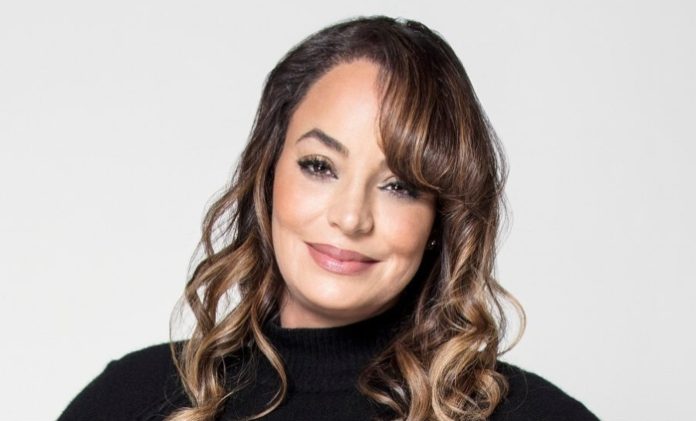Atlantic Records Executive Juliette Jones Takes Us Through Her Twenty-Plus-Year Career in the Music Industry
It’s at the head of someone’s musical campaign or in the face of today’s top-notch radio jockeys that this promotional way-paver is her most dominant. If you were to ask Juliette Jones why… she’d likely tell you that it’s what she’s done best for over twenty years now.
Janet. Whitney. Jill. Usher. Aaliyah. OutKast. Breezy. Cardi. Meek. It’s no secret that every artist’s music she’s commercially led has been in good hands. Whether past or present, the chart-topping hits and long-running anthems from each of those named all deem to be a testament to that. With no lyrics having to be sung or melodies waiting to be played, Jones’ floor-touching résumé speaks for itself.
But how does an everyday chick from Evanston, Illinois go on to occupy a top seat at an Atlantic Records conference table? Simply by fate, hard work, and dedication. Before Jones knew it, she’d gone from servicing customers at a telecommunications company to seeking out faithful clubgoers to market one’s demo to.
However, it was at New York City’s WBLS where Jones set the foundation for the lengthy, august career that she holds today. Through her internship at the station, she established a good rapport with the business, taking her expertise into the offices of some of the biggest professionals. It was because of her go-hard-or-go-home, quick-witted approach to the game that she solidified her stance as a powerhouse player in the music industry, which would remain for many years to come.
Jones was such a move-maker that she soon joined the team of Arista Records while interning for WBLS. Still, her persistence to perfect her craft didn’t cease. Jones branched into independent music promotion for a number of notable record labels, including Priority and even SOLAR Records. But, in 1994, her career went full-throttle, as she landed her first paid position at one of the leading entertainment conglomerates of the ’80s, ’90s’, and early ’00s, Jive Records.
There, Jones managed to take the Hip-Hop/Rap and R&B world by storm. Her valiant ability to rise above the restraints of a gender bias field obtained her a level of respect in a line of work where it isn’t often reciprocated. Be it before a boardroom or behind a stage, she has never been afraid to be someone’s “no” in a room full of yeses.
“I think being authentic and honest is why I still am here. It is easy in such a shiny and interesting business to get a bunch of yes people who will tell you everything you want to hear,” Jones said in a recent statement. “The hard thing is to get someone who will tell you the truth.”
From Virgin Record and Capitol Records to Warner Brothers, RCA and now the EVP of Urban Radio Promotion at Atlantic Records, this woman’s experience, along with her undeniable work ethic, classifies her as the ultimate lady boss. Billboard and Variety, who both did cover stories on Jones, would also agree.
What Juliette Jones wants for her clients, she has no problem getting–even if it means pushing the envelope. And one thing’s for sure: breaking barriers is definitely this music mogul’s strong suit.
Her story just so happens to be living proof.
We recently sat down with Juliette Jones to discuss her introduction to the music business, the evolution of the industry, and how she has maintained her decades-long role in it.
Parlé Mag: Take us back to the very beginning. Where were you born and raised?
Juliette Jones: I was born in Little Rock, Arkansas. I was raised in Evanston, Illinois, which is the suburbs of Chicago. I never lived in Little Rock. I think I was four months old when we moved.
Parlé Mag: What was it like growing up there, and how did it help mold you into the woman you are today?
Juliette Jones: So, Evanston is a college town. Our claim to fame is Northwestern University. It was a great place to grow up. It’s very diverse. It’s literally across the street from Chicago, so [if you lived there] you basically were in the Greater Chicago area. I think because it was a college town, it always felt very safe. Most people’s socioeconomics space were similar. [It was] kind of a middle-class town. So, as an adult, some of those issues that could impact you, we were very fortunate, as kids, that it didn’t. Evanston also has a beach because we have Lake Michigan. People who live by the ocean think that’s funny, but Lake Michigan’s huge, and it was a real beach to us! [laughs]
Parlé Mag: [laughs]
Juliette Jones: In the summer, we would ride our bikes to the beach and hang out.
Parlé Mag: Oh, wow. That sounds fun!
Juliette Jones: Yes! I really enjoyed growing up there. It was a good place to grow up!
Parlé Mag: Feeding off of the last question, let’s talk about that woman you are today. As a top music executive, you have a career in the business that spans over twenty years or more.
When you think of your name, there are certainly many accolades and achievements that come with it. So, tell us where it all started for you.
Juliette Jones: I jokingly tell people I’m like an accidental executive. [laughs]
Parlé Mag: Really? How? [laughs]
Juliette Jones: I was in college. I was focused on accounting, not really decided, but that’s what I was doing. So, long story short, I had a job at MCI, which was a long-distance provider. I worked in Customer Service, and I met a woman at the job who had been in the music business. She left to go to the Dominican Republic; she got married to a guy in the military. As her kids were getting older, she decided to come back to the states to raise them. So, I met her at my job, and she was interested in getting back into the music business. She had been in the business, worked for Clive Davis and all that.
Parlé Mag: Interesting!
Juliette Jones: I was in college, and she said, “Would you like to help me? You know, intern for me?” I knew nothing about the music business, so I asked, “What do I have to do?” She said, “Well, you know, give out stuff at the club.” I was like, “Oh, okay… cool! I’m going anyway!” [laughs] So, I started interning for her. I had cassettes, t-shirts, postcards and things to hand out, so they started letting us in the club for free, which was great because you have no money in college!
Parlé Mag: [laughs] True that!
Juliette Jones: We eventually ended up starting a girls’ street team around that time. I got some of my friends, and we used to stand outside of the club in cute outfits and hand out things.
Parlé Mag: So, it was just something you were thrown into, huh?
Juliette Jones: Yes, it was something I fell into, but then, as I got more exposed to it, I was like, “Wow! This is way better than accounting! and I don’t really know what [else] I’m going to do with my life!” I ended up interning for five years. I interned for her for a while [before I left]. I had a job, an apartment, and a car, so I couldn’t just quit and work for free.
Parlé Mag: Right.
Juliette Jones: So, my job relocated and I got unemployment. I went to the University of Maryland, but I have a lot of friends from Howard. One of my friends from Howard, her Godfather was Percy Sutton… who owns the WBLS in New York. She had gotten Puff (P. Diddy) the internship at WBLS, and he was leaving to go to Uptown Records. When my job moved away from D.C., I took my little unemployment check and moved to New York to take his internship at WBLS. [laughs]
Parlé Mag: [laughs] Wow, so I guess it was just meant to be!
Juliette Jones: Yeah! It afforded me the opportunity to really get involved and build relationships. When I was probably like in my thirties, I actually asked my sister, “As a child, do you remember me being a music lover?” People would ask me that quite frequently, and I don’t necessarily think that about my childhood. She was like, “Yes! You used to join those record clubs and get punished for ordering all that music for hundreds of dollars!” I was like, “Oh, yeah! I did do that!” [laughs] I guess I always had a passion for it, but I never thought of it as a business. Growing up outside of Chicago, I knew nothing about the business.
So, I fell into it through that woman [at MCI]. She eventually left the phone company and got a job working for a record company again. I think her first job–if I remember–was working for MC Hammer’s label, at the time. So, that’s when I really got to learn about the business and got exposed to different stuff.
Parlé Mag: Coming into the entertainment field at the time that you did, how would you say things have changed from then until now?
Juliette Jones: So much has changed! The biggest thing is how we consume music. When I was buying records as a kid, they were cassettes. When I got into the music business, we were in the CD era. So, the CDs were a huge financial boom for music. I entered into my first paying job in the industry at a time when there was a lot of money. We were making a lot of money! People were selling CDs. It was a very exciting time in the music business. There were tons of labels; there was great music. Particularly, having come from D.C., and all the stuff that was happening with Bad Boy Records, that was very exciting. When you look at the landscape today, the industry went through a shrinking period for over a decade. Slowly, now, it’s coming back, from a revenue standpoint, with the streaming and the amazing opportunities for us, digitally. But, the way that we work now, it’s a lot more volume. We have the opportunity to put out a lot more music than we were able to do in the old model, where we had to manufacture CDs, print the paper, go places and all that stuff.
So, the things that have mostly changed are the volume of music that we’re putting out, as well as the turnaround time. Like, how quickly we can actually get something into the marketplace. That’s something that would’ve seemed magical [back in the day]. You know what I’m saying? [laughs] People would’ve been saying, “That’s amazing! How do you do that?” Now, we’re just in a space where it’s a great time, because the business is growing again. It’s a great time for young people to get an opportunity in the business, and it’s exciting! We need it! It’s always fun to inject some new vantage, perspective, and insight into the product.
Parlé Mag: Definitely! Social media plays a big part in it. You could literally put a song on the internet and it goes viral just like that!
Juliette Jones: Absolutely!
Parlé Mag: Being a woman of color in such a male-dominated line of work, when would you say was the first time you experienced misogyny in the workplace? Describe that moment.
Juliette Jones: We’ll assume you don’t mean the entire time I was working in the clubs, handing out cassettes! [laughs] You can only imagine!
Parlé Mag: Wow!
Juliette Jones: I told you I interned for five years, right? Well, in those five years, the big thing, at that time, was conventions. So, you go to conventions, that’s how you meet people. You meet the bosses, that’s how you get a job. I remember there were a couple of labels I really wanted to work at. People talk. [You want to know] if it’s good to work there, do they pay people good money, etcetera, and you look at the artists they have. You have your wish list, where you’d like to go for your internship. One label I wanted to work for, I finally had the opportunity to meet the guy [over the label]. I was like, “Man! I just really want to work for you, your label. I think your label is so great.” He said, “I don’t hire women to do promotion because once you sleep with all of the programmers, what do you have left?”
Parlé Mag: Seriously?! No way!
Juliette Jones: [laughs] So, I hadn’t even gotten a paying job yet when that was said to me!
Parlé Mag: That’s unbelievable!
Juliette Jones: Tell me about it! I showed up for quite a few job interviews where there was no interview, and the job that they wanted me to do was not the job that I do for a living. [laughs] But, as shocking as it was that that man said that to me, I respected his honesty because he didn’t waste my time. At that time, a lot of other men would’ve taken it as an opportunity. I’m just saying this from my experience; I don’t mean everybody, obviously. I had other experiences where they would promise me a job and drag it out and really try to go on a date. They would try to use their power to leverage me, in some way. So, at least, the guy was straight-up with me. Like, “I’m never going to hire you!” As my experiences continued, I actually grew to really appreciate that he was that candid [with me]. I mean, it was shocking, but that’s what he thought! I believe he may be retired from the business, and he, maybe, hired two women, ever, to do promotion his whole career.
Parlé Mag: Is this something that you still face… to this day?
Juliette Jones: I’ve been doing this for so long. With promotions, it’s relationships, so I’ve talked to some of the same people for many, many years now. A lot of it has died down because we know each other and we’re older, and I know their families. But there are still elements of it.
Parlé Mag: I can see that!
Juliette Jones: We still see the disparity of women in the big offices. There’s an important point that I would like to share with you because it’s fascinating and I always tell people this. When you talk to most radio stations, they will tell you that they research for women. When you think about who you’re trying to sell the music to or encourage the consumers to consume the music, a lot of times, it’s women. So, the big functions of A&R, where they’re making the records, there are very few women in that. Even though most people’s target for selling it is women and radio is mostly targeting female listeners as their number-one demographic, very few women are programming and very few women are running promotion. So, even in a space where it’s up to us to like it and consume it, they don’t necessarily want our input. [laughs] That’s kind of crazy!
Parlé Mag: That is!
Juliette Jones: I don’t know if that’s true that they don’t want it, [but] I do think, a lot of times, it’s just overlooked. It’s always been that way, so it’s like… if it’s not broken to them, they’re not looking to fix it. It’s interesting to me. I do think it’s great how vocal everyone is about what’s happening to women, and with women, in the workplace. But, obviously, it’s going to be a process. We still have lots of room to grown–particularly, in the big, decision-making power jobs.
Parlé Mag: Why do you think men of power tend to feel threatened when there’s a woman who challenges his position of authority?
Juliette Jones: It’s hard to say. Probably a whole bunch of different reasons! [laughs] We’re all dealing with our own cultural beliefs and social beliefs.
Parlé Mag: Egos, too!
Juliette Jones: Yes! Egos as well. Quite a few of the women I work with, we work with a lot of men whose wives don’t work. So, we’re like unicorns in comparison [to them]. And, no, I do not want this to come off, in any way, disrespectful to women who don’t work and take care of their families. My sister has been one for years. I admire her greatly. That’s not the point I’m trying to make. It’s that, the relationship is different. Do you know what I’m saying?
Parlé Mag: Definitely.
Juliette Jones: Like, how men will interact with the woman they take care of, who runs their household, [versus a woman who makes her own living]. I literally had one boss say to me one time, when I asked for a raise, “You’re cute; you should be able to get some dude to pay your bills.”
Parlé Mag: The nerve! And, see, they’re just going off of what they’re used to!
Juliette Jones: Exactly! Because his wife doesn’t work, right, this is what he thinks! He found a woman and he takes care of her, so that’s his vantage of it. So, I don’t know if it’s always that they feel threatened. I’ve also said before that I’m not sure if it’s an intentional “we’re all in the room, and we’re going to keep the ladies out.” I think it’s that “we’re all in the room, and we’ve always been in the room.”
Juliette Jones: Like, we’re all in here together, so we don’t really give it any thought. [laughs]
Parlé Mag: [laughs] So, how have you managed to demand the respect that you deserve and break the barriers that you’ve broken, even with the odds placed against you?
Juliette Jones: Well, respect is a fluid thing. So, I hope that people respect what I do. I have always believed that, for me, personally, I let the work lead first. I really like promotion because it’s really quantifiable. I get a report card every Monday morning when the [music] chart comes out. So, if my record is number one, we don’t have to squabble about if I did a good job. That’s as good as it gets for what I do! The fact that I have very tangible results, where some other pieces of creative work are more subjective, has been tremendously helpful in garnering respect. The results don’t lie; they see the work that I do. I think I have a really good work ethic. My job is based on relationships, so some of these people, I’ve been talking to them for decades. It’s important that I’ve always dealt with them from a place of integrity. I’m honest with them, and I do good business with them. I respect that, as great of a job this is, it’s still a job. Everybody has a wife and a family and other things going on.
So, I think that has helped, and I grew up in a household where my mom said, “If you can’t take it, don’t dish it out.”
Parlé Mag: Amen! [laughs]
Juliette Jones: [laughs] I try to be respectful when I interact with people. It does not work one hundred percent of the time, but it is definitely my goal.
Parlé Mag: Looking back on your journey in the business, what are some critical moments that assisted in shaping your success?
Juliette Jones: Ironically, my first full-time, paying job in the record business was with Jive Records. I loved it! I was working with Jive Records, I’m from Chicago, R. Kelly was the king of Jive Records, at the time, my name is Juliette–the whole thing had a ring. [laughs]
Parlé Mag: [laughs] Gotcha.
Juliette Jones: Juliette from Jive! I really loved it. Fast forward a couple of promotions and some years later, I ended up losing that job. I was devastated! I mean, it was almost nine years, but it was devastating.
Parlé Mag: If you don’t mind me asking, why did you lose your position at Jive?
Juliette Jones: Basically, we were contract employees. My contract was expiring, and the role I was looking to do in the company, I don’t think my immediate boss wanted me to do that role for him, at that time. It was all a very bizarre experience, but there was no concrete reason because when you’re a contract employee, it doesn’t have to be. But, in hindsight, the point I was trying to make to answer your question is, we always say, “You’re not really in it until you’ve lost a job one time.” [laughs] Because everybody does… at some point. It just happens! But, it ended up being a gift because I was so committed to that job that I had not been thinking about opportunities in the business as a greater business. It was just about Jive and my job. So, once I left that job, I ended up taking a job at HITS Magazine and becoming the urban editor for them for a couple of years, which was way out of my comfort zone. I moved coast-to-coast, from New York to Los Angeles.
What I learned at HITS and what I got from that experience–living in Los Angeles, building new relationships, working in the magazine, and kind of being on the outside looking in, to a degree–was a much clearer vantage of what was happening in the music business and where I wanted to go next with my career. So, losing that job [at Jive] was a huge catalyst for my success. It forced me to think about it and not just stay here forever and hope I get promoted until I retire.
Parlé Mag: Yes! And think outside of the box. That’s amazing. It was a blessing in disguise!
Juliette Jones: Always is! Every thought! It always has been. That, I know for sure. So, [going to HITS] was a big thing, and working at Jive was incredible. R. Kelly was such a big star when I started that everybody would take my call. I’m very aware, today, that if you start out where you don’t have a valuable artist or a big star to start, it’s harder! They don’t know you; they don’t know the artist. Everybody’s calling them! So, the opportunity to work at that company, learn so much from them, and have such an entree in the music business, it gave me a huge skillset to build on. Especially once I built all of those relationships. HITS helped me to understand how to utilize it.
Parlé Mag: With people expecting so much of you, on a daily basis, would you say that your profession gets mentally overwhelming at times? If so, what do you do to sort of unplug and maintain your sanity through it all?
Juliette Jones: It does get overwhelming at times! I have a big staff; we have a lot of volumes, and we’re just constantly busy. I always tell people that our product is a person, but like, at Nike, you don’t have to stop what you’re doing to talk to Air Jordan on the phone because they’re unhappy with a marketing campaign on the sneaker. [laughs] Maybe they have to talk to Michael Jordan, but you know what I’m saying!
Parlé Mag: No worries, I get it! [laughs]
Juliette Jones: Our product is actually a human being! So, that adds to it [being mentally overwhelming] as well because this is a person. It’s their face, it’s their voice. It’s them who you are representing, so they obviously have a lot of feelings about how they should be represented, which is valid. So, all of those things–just the volume of it all, managing the people–it keeps us busy, and it can get overwhelming at times. I really like to read, I like to travel, I like to spend time with friends, and I also like to spend time working on outside things that I find fulfilling.
Parlé Mag: You’ve been in the industry for quite some time now. There’s always this debate about whether it truly takes talent or not to get to the top anymore.
Some people believe that, nowadays, if you have a good beat, a nice look, and a strong personality, you could score a number one hit on the charts. So, as someone who actually sees the ins and outs of what it takes to get a record played, what are your thoughts on that?
Juliette Jones: I think musical taste changes. It’s generational! My mom’s parents probably thought her music, in her era, was terrible. My mom thought our music was awful. My sister thinks her kids’ music is terrible. I don’t know if it’s a quality thing or if it’s a generational taste issue. With all of the volume, you do have an opportunity, as an artist, to get exposed because there are so many outlets: Soundcloud, Spotify, Apple, Tidal, and this one, that one. There are just a million places to consume music, and there are a million places for you to put your music up for people to consume it. But, as far as the radio goes, we have a finite amount of time on the radio. So, whereas there’s more and more music in the universe that people are consuming, there isn’t any more time in the day for mainstream radio to play it. If you want a number-one record, it sort of works like this now. Before, there were a hundred sharks in the tank, and forty made it to the finish line. Now, you have fifteen hundred sharks in the tank, and forty are only going to make it to the finish line.
Readers Might Also Like:
 [INTERVIEW] Back For An Encore, Akon Opens Up About His Musical Renaissance
[INTERVIEW] Back For An Encore, Akon Opens Up About His Musical Renaissance
 A Moment with K. Michelle: All About Her New Album, All Monsters Are Human, Industry Lessons, and Her Country Music Career
A Moment with K. Michelle: All About Her New Album, All Monsters Are Human, Industry Lessons, and Her Country Music Career
 How Much Do Artists Really Get Paid For Streams – A Financial Breakdown
How Much Do Artists Really Get Paid For Streams – A Financial Breakdown
 Ryan Leslie Sacrificed A Lot To Settle His Lengthy Legal Battle, But He’s Doing Alright
Ryan Leslie Sacrificed A Lot To Settle His Lengthy Legal Battle, But He’s Doing Alright

